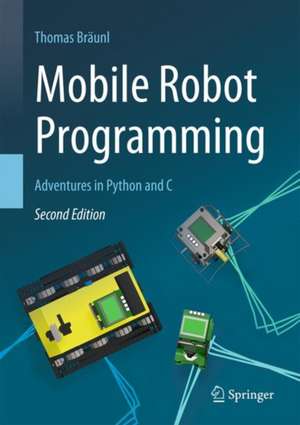Mobile Robot Programming: Adventures in Python and C
Autor Thomas Bräunlen Limba Engleză Hardback – 17 aug 2023
EyeSim is a free software for MacOS, Windows and Linux, which uses a realistic physics simulation engine and is source-code compatible to the EyeBot mobile robots. So, each robot program can first be tested on the simulator before running it on a real robot. EyeSim includes modules for driving, walking, swimming and diving robots, as well as for robot manipulators. EyeSim also runs on the Meta/Oculus Quest, providing a fully immersive robotics experience in virtual reality.
Beginning with simple driving algorithms and sensor data processing for distance sensors, Lidar and camera, the book progresses to more complex localization and navigation tasks, as well as vision-based navigation and genetic algorithms. It concludes with artificial intelligence applications for mobile robots in traffic scenarios and full-size autonomous vehicles.
This book is suitable as a text for undergraduate and graduate courses in Robotics, Automation and Artificial Intelligence, as well as a self-study guide for practitioners and hobbyists. All robot application programs in this book are available as free downloads for MacOS, Windows, Linux, and Raspberry Pi OS.
Preț: 463.79 lei
Preț vechi: 579.73 lei
-20% Nou
Puncte Express: 696
Preț estimativ în valută:
88.77€ • 96.46$ • 74.62£
88.77€ • 96.46$ • 74.62£
Carte tipărită la comandă
Livrare economică 17-23 aprilie
Preluare comenzi: 021 569.72.76
Specificații
ISBN-13: 9783031327964
ISBN-10: 3031327969
Pagini: 191
Ilustrații: IX, 191 p. 1 illus.
Dimensiuni: 210 x 279 mm
Greutate: 0.73 kg
Ediția:2nd ed. 2023
Editura: Springer International Publishing
Colecția Springer
Locul publicării:Cham, Switzerland
ISBN-10: 3031327969
Pagini: 191
Ilustrații: IX, 191 p. 1 illus.
Dimensiuni: 210 x 279 mm
Greutate: 0.73 kg
Ediția:2nd ed. 2023
Editura: Springer International Publishing
Colecția Springer
Locul publicării:Cham, Switzerland
Cuprins
Building Robots.- Robot Programming.- Driving Algorithms.- Lidar Sensors.- Robot Swarms.- Wall Following.- Alternative Drive Systems.- Submarines and Boats.- Mazes.- Navigation Algorithms.- Robot Vision.- Starman.- Autonomous Driving.- Automotive Robots.- Formula SAE.- Outlook.- Appendix.
Notă biografică
Thomas Bräunl is a Professor in the School of Engineering at The University of Western Australia, Perth, where he directs the Robotics & Automation Lab as well as the Renewable Energy Vehicle Project (REV). He has developed numerous robotics systems, including the EyeBot robot family and the EyeSim simulation system. On the automotive side, he has done research on electric drive and charging systems, and is developing AI solutions for autonomous driving. Professor Bräunl worked on Driver-Assistance Systems with Mercedes-Benz Stuttgart and on Electric Vehicle Charging Systems with BMW Munich and BMW Mountain View. He holds a Diploma from the University of Kaiserslautern, an M.S. degree from the University of Southern California, Los Angeles, and a Ph.D. and Habilitation from the University of Stuttgart.
Textul de pe ultima copertă
This book emphasizes software design as the most important topic in modern robotics and demonstrates practical code examples in Python and C. The book introduces the free simulation system EyeSim in combination with EyeBot robots, which can be built from inexpensive embedded processors, sensors and motors – or by adapting the control inputs of model cars.
EyeSim is a free software for MacOS, Windows and Linux, which uses a realistic physics simulation engine and is source-code compatible to the EyeBot mobile robots. So, each robot program can first be tested on the simulator before running it on a real robot. EyeSim includes modules for driving, walking, swimming and diving robots, as well as for robot manipulators. EyeSim also runs on the Meta/Oculus Quest, providing a fully immersive robotics experience in virtual reality.
Beginning with simple driving algorithms and sensor data processing for distance sensors, Lidar and camera, the book progresses to more complex localization and navigation tasks, as well as vision-based navigation and genetic algorithms. It concludes with artificial intelligence applications for mobile robots in traffic scenarios and full-size autonomous vehicles.
This book is suitable as a text for undergraduate and graduate courses in Robotics, Automation and Artificial Intelligence, as well as a self-study guide for practitioners and hobbyists. All robot application programs in this book are available as free downloads for MacOS, Windows, Linux, and Raspberry Pi OS.
EyeSim is a free software for MacOS, Windows and Linux, which uses a realistic physics simulation engine and is source-code compatible to the EyeBot mobile robots. So, each robot program can first be tested on the simulator before running it on a real robot. EyeSim includes modules for driving, walking, swimming and diving robots, as well as for robot manipulators. EyeSim also runs on the Meta/Oculus Quest, providing a fully immersive robotics experience in virtual reality.
Beginning with simple driving algorithms and sensor data processing for distance sensors, Lidar and camera, the book progresses to more complex localization and navigation tasks, as well as vision-based navigation and genetic algorithms. It concludes with artificial intelligence applications for mobile robots in traffic scenarios and full-size autonomous vehicles.
This book is suitable as a text for undergraduate and graduate courses in Robotics, Automation and Artificial Intelligence, as well as a self-study guide for practitioners and hobbyists. All robot application programs in this book are available as free downloads for MacOS, Windows, Linux, and Raspberry Pi OS.
Caracteristici
Robot programming for undergraduate and graduate courses in Robotics and AI, from introductory to expert Level Covers mobile robot design, robot application software development with traditional, AI techniques All software, over 100 robot programs can be freely downloaded for MacOS, Windows, Linux and Raspberry Pi OS
